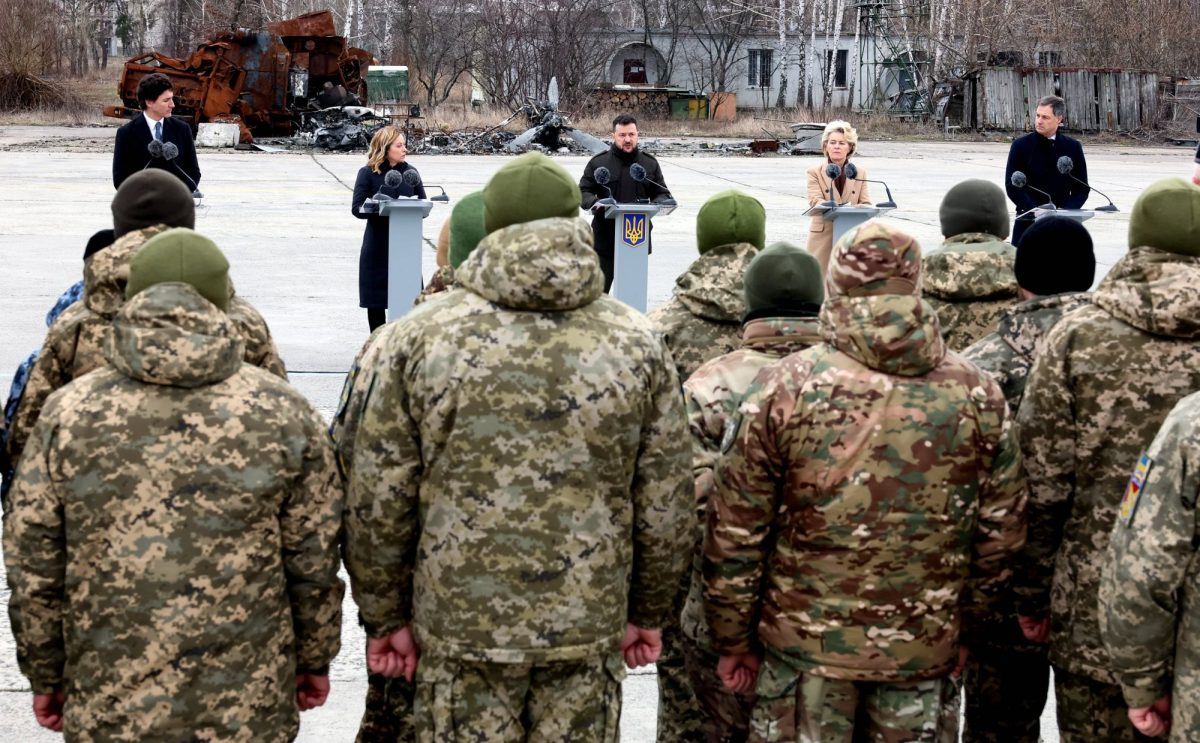KYIV, (Reuters) – European Commission President Ursula von der Leyen vowed that Europe would back Ukraine until it was “finally free” as she and three other Western leaders arrived in Kyiv to show solidarity on the second anniversary of Russia’s full-scale invasion.
The visit by von der Leyen and the prime ministers of Italy, Canada and Belgium – Giorgia Meloni, Justin Trudeau and Alexander De Croo – was a show of support as Ukraine suffers shortages of military supplies that are hurting it on the battlefield as Moscow grinds out territorial gains.
“More than ever, we stand firmly by Ukraine. Financially, economically, militarily, morally. Until the country is finally free,” Von der Leyen, who came with the others on an overnight train from neighbouring Poland, wrote on the social media platform X.
The leaders visited Hostomel airport, site of a ferocious battle at the start of the invasion as Russia tried to fly in paratroopers to seize the capital Kyiv a few kilometres away.
“We are here today to say thanks to these men and women who on February 24 two years ago did not run away and instead fought,” Meloni said. “This place is a symbol of Moscow’s failures, a symbol of Ukrainian pride.”
Ukrainian President Volodymyr Zelenskiy embraced the Western leaders and delivered a televised speech against a backdrop of wrecked aircraft.
“Two years ago we met enemy troopers here with fire, and two years later, we are meeting our friends, our partners, here,” he said.
“Any normal person wants the war to end. But none of us will allow our Ukraine to end,” he added. “The word ‘independent’ will always stand next to the word ‘Ukraine’ in future history.”
Outside Kyiv, the war continued unabated.
Russian drones attacked the port of Odesa for a second night running, hitting a residential building, killing one person, the regional governor said. In Dnipro, a Russian drone hit an apartment building and a rescue operation uncovered two dead.
Meloni and Trudeau were expected to sign security pacts with Zelenskiy during their brief stay, in line with deals recently agreed with France and Germany worth billions of dollars.
US AID STILL BLOCKED
However, $61 billion in aid promised by U.S. President Joe Biden is being blocked by Republicans in Congress, casting a long shadow over Kyiv’s hopes of pushing back the much larger, better supplied Russian military.
Biden was due to take part in a video conference of fellow leaders of the Group of Seven (G7) major democracies on Saturday, with Zelenskiy invited to join in.
The West sees the invasion as an unjustified act of aggression that must be repelled and Italy, current chair of the G7, said it was vital to challenge perceptions that it was wearying of the conflict and Russia was winning.
When Russian tanks and infantry streamed across the border before dawn on Feb. 24, 2022, Ukraine’s 40 million people defied expectations by slowing and stopping their advance.
But as the war enters its third year, setbacks in the east have left Ukraine’s army looking vulnerable.
Seeking to maintain Western focus on Ukraine, Zelenskiy has warned that Russian President Vladimir Putin may not stop at Ukraine’s borders if he emerges victorious.
Putin dismisses such claims, and casts the war as a wider struggle with the United States, which he says aims to dismantle Russia.
Anniversary events were planned across Ukraine, including a service to commemorate those who died in Bucha, north of Kyiv – scene of some of the worst alleged war crimes of the conflict.
Ukraine said on Friday it had launched investigations into more than 122,000 suspected war crimes in the last two years, which Russia denies carrying out.
The initial shock of the invasion has gradually faded into familiarity and then fatigue, as the world watched initial Russian gains and a stunning Ukrainian counteroffensive in late 2022 slow into grinding trench warfare.
In scenes reminiscent of the battlefields of World War One, soldiers under heavy artillery fire are dying in their thousands, sometimes for a few kilometres of land.
Both sides have developed huge and sophisticated fleets of air and sea drones for surveillance and attack.
Russia, with a much bigger population to replenish the army’s ranks and a larger military budget, might favour a drawn-out war, although its costs have been huge as it seeks to navigate sanctions and a growing reliance on China.

